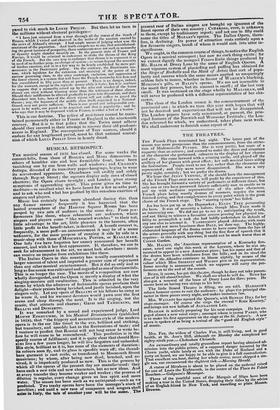MUSICAL RETROSPECT.
THE musical season of 1836 has closed. For some weeks the concert-bills, from those of BOSCHA and MORI dimensions to others of bumbler size and less formidable front, have been vanishing one by one from walls and windows ; and CasmEE's hottega, divested of' its transitory paper-hangings, begins to wear its accustomed appearance. Omnibuses roll swiftly and safely through Regent Street ; the squares display only rows of closed shutters; the Opera closes to-night ; and London gives strong symptoms of approaching quiet. This pause gives us time to meditate—to recollect what we have heard for a few months past, and to ask who and what has profited by this ceaseless exertion of singers and players. Music has certainly been more abundant during this than any former season : frequently it has happened that the heated atmosphere of the Hanover Square Rooms has been gasped by two sets of auditors in the same day. From per- formances like these, where rehearsals are unknown, where singers and players come " like wearied wretches" to their toil, little advantage to the art, little pleasure to the hearers, often little profit to the benefit-taker, is derived. A benefit concert is, frequently, a mere puff—an announcement it may be of a name unknown, for the mere purpose of ranging it side by side in a music-shop with those of MOSCHELES, POTTER, or KIALLMARK. One lady (we have forgotten her name) announced her benefit concert, and with it her first appearance. If, therefore, we are to seek for advancement in the art, we must look elsewhere : music can receive no impulse from exhibitions like these.
The Italian Opera in this country has usually concentrated a larger amount of talent and imparted a greater sum of enjoyment than any other musical entertainment. But it did so only and so long as fine music was cultivated and regarded as one of its essentials. This is no longer the case. The merits of a composition are now wholly disregarded, and the Opera is merely a display of what the singing-masters call vocalization. This is admitted in the very terms by which the admirers of fashionable operas proclaim their delight—their praises being lavished, and justly lavished, upon the singers only. Let any opera of BELLINI or his fellows be sung as he wrote it, and his warmest devotees would yawn over the first scene and sleep through the next. It is the singing, not the music, that attracts and charms; GRISI and TAMBURINI, not BELLI NI and Dositzwerr.
It was remarked by a sound and experienced judge, Lord MOUNT EDGECUMBE, in his Musical Reminiscences (published in ISM, that "the frippery and meretricious style of the modern
opera is to the ear like tinsel to the eye, brilliant and striking,
but transitory, and speedily lost in the fluctuations of taste; and I venture to predict that Rossini will not long cease to write be- fore he will cease to be remembered." This prediction is in the speedy course of fulfilment; and it is quite clear that should Ros- suet live a few years longer, Ile will live forgotten and unheeded.
His style, brilliant as it is, has none of the elements of duration:
its colours soon fly, and its gloss is speedily worn off; the thread- bare garment is cast aside, or transferred to Monmouth Street
musicians; by whom, after being new dyed, brushed, and re- vived, it is impudently produced as new. This is the process by which all the operas of the present day are manufactured: they
have each a new title and new characters, but no new ideas. And at every transfer they become weaker and weaker ; the process of dilution is regular, every change gives us less spirit and more
water. The season has been such as we anticipated—such as we predicted. Two trashy operas have been the manager's stock of novelties; and until a new race of composers and singers shall arise in Italy, the tale of another year will be the same.. The
present race of Italian singers are brought up ignorant of the finest operas of their own country ; ClitssosA, even, is unknown to them, except by traditionary report; and not one in fifty could name the titles of MOZART'S operas. The Italian Opera, there- fore, is declining. Its power of attraction rests entirely upon a few favourite singers, bereft of whom it would sink into utter in- significance. We ought, in the common course of things, to notice the English Opera in a musical retrospect ; but now no such thing exists ; for we cannot dignify the mongrel Franca-Italic things produced by Mr. BALFE at Drury Lane by the name of English Operas. A most vigorous system of plaearding and puffing has obtained for the Siege of Rochelle and the Maid of Artois that sort of popu- larity and success which the same means applied as unsparingly seldom fails to insure, whether in favour of WARREN'S blacking, MORISON'S pills, or BALFE'S operas. We are not insensible to, the merit they possess, but its amount is small ; of the last very small. It was sustained on the stage wholly by MALIBRAN, and will never be produced with a different representative of her cha- racter.
The close of the London season is the commencement of the provincial one ; to which we turn this year with hopes that will
not be deceived and expectations that will not be disappointed. The London papers have only announced, at present, the prin- cipal features of the Norwich and Worcester Festivals ; the Lon- don rehearsal for which, we understand, takes place next week. We shall endeavour to furnish some report of it.


























 Previous page
Previous page